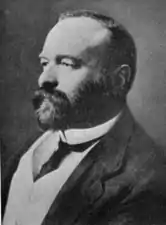Franklin Henry Giddings
Franklin Henry Giddings (March 23, 1855 – June 11, 1931) was an American sociologist and economist.

Biography
Giddings was born at Sherman, Connecticut. He graduated from Union College (1877). For ten years he wrote items for the Springfield, Massachusetts Republican and the Daily Union. In 1888 he was appointed lecturer in political science at Bryn Mawr College; in 1894 he became professor of sociology at Columbia University. From 1892 to 1905 he was a vice president of the American Academy of Political and Social Science.
His most significant contribution is the concept of the consciousness of kind, which is a state of mind whereby one conscious being recognizes another as being of like mind. All human motives organize themselves around consciousness of kind as a determining principle. Association leads to conflict which leads to consciousness of kind through communication, imitation, toleration, co-operation, and alliance. Eventually the group achieves a self-consciousness of its own (as opposed to individual self-consciousness) from which traditions and social values can arise.
In 1914 he became one of the inaugural Fellows of the American Statistical Association.[1]
Works
- The Modern Distributive Process (in collaboration with J.B. Clark, 1888).
- The Theory of Sociology (1894).
- The Principles of Sociology (1896).
- The Theory of Socialization (1897).
- Elements of Sociology (1898).
- Democracy and Empire (1900).
- Inductive Sociology (1901).
- Descriptive and Historical Sociology (1906).
See also
References
- List of ASA Fellows Archived 2016-06-16 at the Wayback Machine, retrieved 2016-07-16.
External links
- Works by Franklin H. Giddings at Project Gutenberg
- Works by or about Franklin Henry Giddings at Internet Archive
- Works by Franklyn Henry Giddings, at Hathi Trust
- Interview on the economic aspects of the War by Edward Marshall, New York Times. Published January 9, 1915
- Franklin Henry Giddings at Find a Grave
- Franklin Henry Giddings Collection. General Collection, Beinecke Rare Book and Manuscript Library, Yale University.